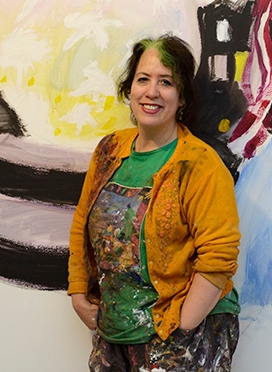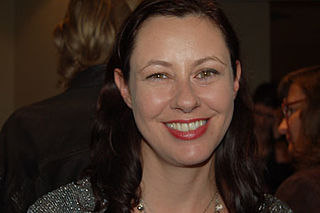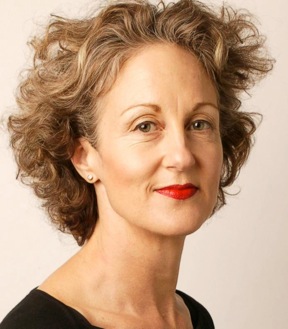Related Research Articles

The Bulletin was an Australian weekly magazine first published in Sydney on 31 January 1880. The publication's focus was politics and business, with some literary content, and editions were often accompanied by cartoons and other illustrations. The views promoted by the magazine varied across different editors and owners, with the publication consequently considered either on the left or right of the political spectrum at various stages in its history. The Bulletin was highly influential in Australian culture and politics until after the First World War, and was then noted for its nationalist, pro-labour, and pro-republican writing.

Ernestine Hill was an Australian journalist, travel writer and novelist.

Wendy Sharpe is an Australian artist who lives and works in Sydney and Paris. She has held over 70 solo exhibitions nationally and internationally, been awarded many national awards and artist residencies for her work, and was an official Australian War Artist to East Timor in 1999–2000.
Carmelina Marchetta is an Australian writer and teacher. Marchetta is best known as the author of teen novels, Looking for Alibrandi, Saving Francesca and On the Jellicoe Road. She has twice been awarded the CBCA Children's Book of the Year Award: Older Readers, in 1993 and 2004. For Jellicoe Road she won the 2009 Michael L. Printz Award from the American Library Association, recognizing the year's best book for young adults.

Alison Croggon is a contemporary Australian poet, playwright, fantasy novelist, and librettist.
Jennifer Rankin was an Australian poet and playwright.

Kate Forsyth is an Australian author. She is best known for her historical novel Bitter Greens, which interweaves a retelling of the Rapunzel fairy tale with the true life story of the woman who first told the tale, the 17th century French writer Charlotte-Rose de Caumont de La Force.
Marie Tulip was an Australian feminist writer, academic and proponent for the ordination of women as priests.

Elizabeth Margaret Farrelly, is a Sydney-based author, architecture critic, essayist, columnist and speaker who was born in New Zealand but later became an Australian citizen. She has contributed to current debates about aesthetics and ethics; design, public art and architecture; urban and natural environments; society and politics, including criticism of the treatment of Julian Assange. Profiles of her have appeared in the New Zealand Architect, Urbis, The Australian Financial Review, the Australian Architectural Review, and Australian Geographic.
Raymond Frank "Ray" Mathew was an Australian author. Mathew wrote poetry, drama, radio plays and filmscripts, short stories, novels, arts and literature criticism, and other non-fiction. He left Australia in 1960 and never returned, dying in New York where he had lived from 1968.

Christine Elizabeth Townend is an Australian animal rights activist, artist, and author.
Magabala Books is an Indigenous publishing house based in Broome, Western Australia.
This article presents a list of the historical events and publications of Australian literature during 1929.
This article presents a list of the historical events and publications of Australian literature during 1961.
This article presents a list of the historical events and publications of Australian literature during 1965.
This article presents a list of the historical events and publications of Australian literature during 1862.

Sylvia Lawson was a journalist, academic and author, known for her support for cinema in Australia through her work with the Sydney Film Festival from its inception in 1954. She wrote The Archibald Paradox, a study of The Bulletin and its founder, J. F. Archibald.

Jessie Urquhart was an Australian journalist, novelist and short-story writer.
Lyndall Hadow (1903–1976) was a Western Australian short story writer and journalist. The Lyndall Hadow Annual Award for Short Stories was created by the Fellowship of Australian Writers Western Australia (FAWWA) in 1977 to honour her.
Jena Woodhouse is a Brisbane-based Australian novelist and poet.
References
- ↑ "Mena Abdullah". Oxford Reference. Retrieved 8 March 2021.
- ↑ "Uneven Standard In Anthology". Canberra Times (ACT : 1926 - 1995). 14 March 1959. p. 11. Retrieved 8 March 2021.
- ↑ Burns, Connie; McNamara, Marygai (1989). Feeling restless. Sydney, NSW: Collins Australia. p. 274. ISBN 0-7322-2500-0. OCLC 21295473.
- 1 2 3 4 5 "Mena Abdullah". Pieced Work. 14 September 2018. Retrieved 8 March 2021.
- ↑ "Mena Abdullah". AustLit. Retrieved 8 March 2021.
- ↑ Wilde, W. H. (1994). The Oxford companion to Australian literature. Joy W. Hooton, B. G. Andrews (2nd ed.). Melbourne: Oxford University Press. ISBN 0-19-553381-X. OCLC 32470151.
- ↑ "Archibald Prize finalists 1953 :: Art Gallery NSW". www.artgallery.nsw.gov.au. Retrieved 12 March 2021.
- 1 2 Mathur, Malati (2013). Bridging imaginations : South Asian diaspora in Australia. Amit Sarwal. New Delhi: Published by Readworthy Publications in association with Australia-India Interdisciplinary Research Network. pp. 324–335. ISBN 978-93-5018-279-6. OCLC 823821418.
- ↑ Kennedy, L. (10 January 1993). "A tale of peacocks and tiger friends in the garden". Canberra Times (ACT : 1926 - 1995). p. 18. Retrieved 8 March 2021.
- ↑ Abdullah, Mena; Mathew, Ray (1989). The time of the peacock: stories. North Ryde, N.S.W: Sirius. ISBN 978-0-207-16277-0.
- ↑ Austlit. "The Red Koran | AustLit: Discover Australian Stories". www.austlit.edu.au. Retrieved 8 March 2021.